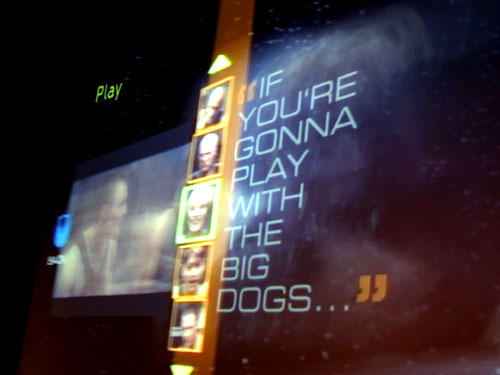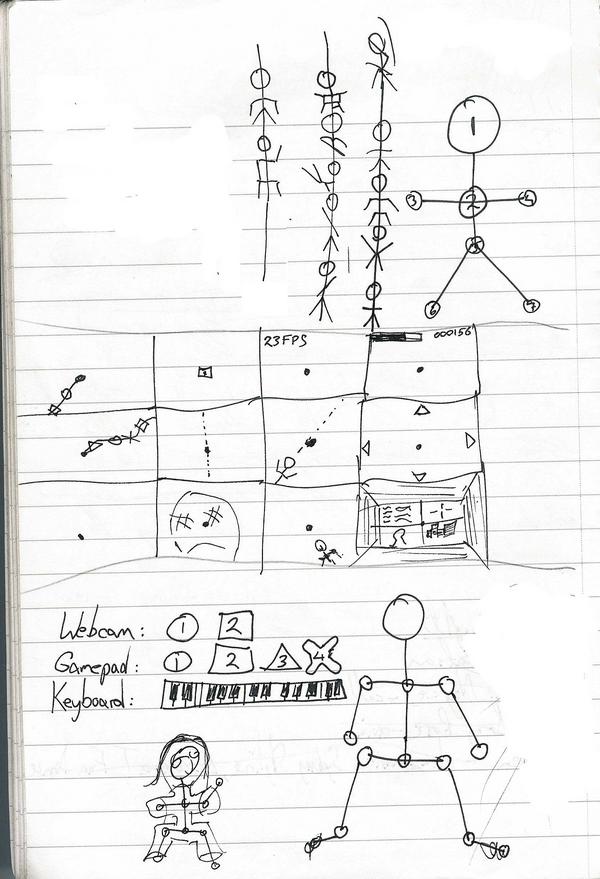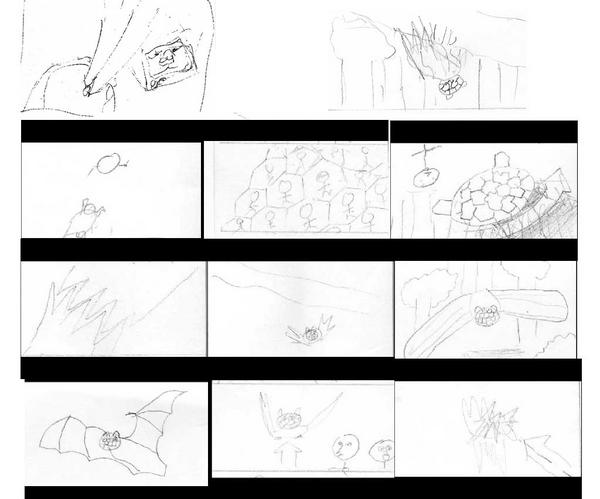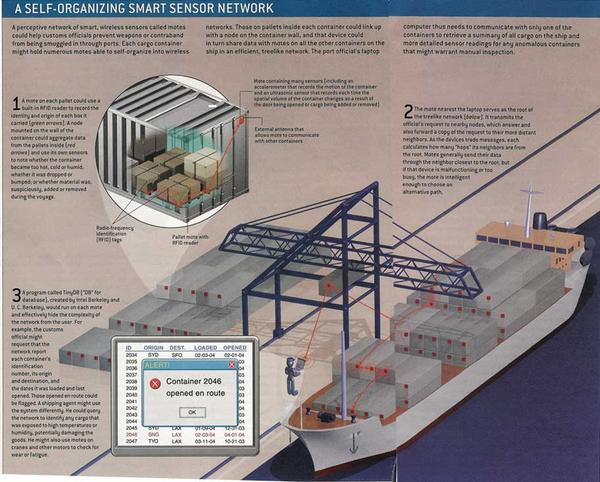August 31, 2004
Preliminary design document
Preliminary DVD design document for Sanctuary
See Wiki page for updates and latest version
August 27, 2004
Introduction to the Headbin
The Blogmap link is the best overview, showing what categories are being worked on. http://thequality.com/flics/10weeks/blog/blogmap.html
From there, the Imagery category is of most relevance at the moment given the focus on conceptual art and storyboarding with a view to being able to budget production. http://thequality.com/flics/10weeks/blog/archives/cat_imagery.html
Iĺm trying to strike a balance between giving collaborators room to visualize this (by not publishing my crude boards in full) and giving examples of what Iĺm talking about. That said, key posts at the moment are:
GUI aesthetic in Sanctuary
http://thequality.com/flics/10weeks/blog/archives/001685.html
Conceptual elements
http://thequality.com/flics/10weeks/blog/archives/001687.html
Risk of visual clash
The style of camerawork, lighting design and GUI overlays currently being considered lend the film an almost archival quality. The images will feel very immediate, very real, as if found in some dusty vault a hundred years from now.
This means that the barrier between spectators and spectacle will be very shallow. They will pick up on anything within the story universe that doesn't ring absolutely, 100% true.
Therefore the production design, in particular any future technology (e.g. the RIG, nanobats, wearable screens, etc.), will have to be very carefully realised to avoid raising any questions from the audience. They will have to believe that not only might things be designed this way in the future, but that they couldn't, in fact, have been designed any other way.
August 26, 2004
Freeframe and VJAMM
Matt Black (Coldcut) just rang to plug VJAMM as the ideal technical solution for playing a film as a musical instrument. We had a long conversation and I promised that we'd have a look at it.
* VJAMM designed for seamless video and audio looping
* Freeframe is an OSS VJ plugin framework
* vjs.net may be able to help us recruit VJs to the beta community
Interactivity in a nutshell
Look up at the sky
Now move round the screen
See like the hero
Fly round the scene
I wrote this while I was writing the funding application as a simple reminder of what it is I want to do. It still applies so I thought I'd better blog it.
Software patenting
An issue to consider once the Interactive Design Documentation is submitted on Monday.
Massive: Software's game of mutually assured damage
MULTIVISION 235, 2 Perf CAMERA SYSTEM
Ross has been telling me about MULTIVISION 235, a 2 perf camera system that uses half of the linear footage of the conventional 4 perforation system for 35mm film.
August 20, 2004
Project Schedule
All %ages as per Microsoft Project
http://thequality.com/flics/10weeks/blog/archives/docs/20040820_Tasks.xls
Key Tasks we are behind schedule on:
*Mentors Agreed
*Tools Developer Hired
*Film Producer Appointed
*Hire Concept Artist
August 19, 2004
Maximizing distribution
An overview article written for the Directors Guild of America
http://www.dga.org/news/v28_5/craft_maxdist.php3
August 18, 2004
3D data visualization
http://hydra3d.sourceforge.net/indexFrames.html
http://graphics.stanford.edu/~munzner/h3/
http://www.caida.org/tools/visualization/walrus/
http://www.touchgraph.com/index.html
Concept Art Elements
These are the script elements requiring concept art.
Note: the State government department aesthetic needs to be offset against the eco-activist look
SETS
*State Registry (virtual warehouse)
*Blake's bedroom
*Aerial View of sanctuary and the urban sprawl
*DENR recording room
*Bush landscape - burning wreckage of heavy logging equipment
*Eco-activist HQ scene 'beat up vans, bikes'
CHARACTERS
*CD - Blake's software agent, permutations of
*Blake
*Blade - Blake's avatar (new super-hero)
*State Dog and Visor
*State Trooper
PROPS
*DENR logo
*Nanobat (schematic mechanism - open and closed)
*File (virtual), component of State Registry
*State surveillance camera
*Logging Truck
*Wearable Interface (Costume Designer?)
*Trooper Transport Vehicle
*Trooper's Rifle
*Activist flexi-screen in clothing
SPAA talk
My overview of the project as presented at SPAA 2004 in August on the Gold Coast.
http://www.modfilms.com/archives/20040808_spaa.ppt
August 17, 2004
GUI aesthetic in Sanctuary
SPACE
Our hero (Blake) is a hacker, able to move freely between different computer systems, represented by different GUIs. The aim is to enable a passive non-technical audience to understand Blake´┐Żs power over virtual worlds, and any constraints, in a realistic manner. This constitutes the film´┐Żs ´┐Żhacker´┐Ż aesthetic.
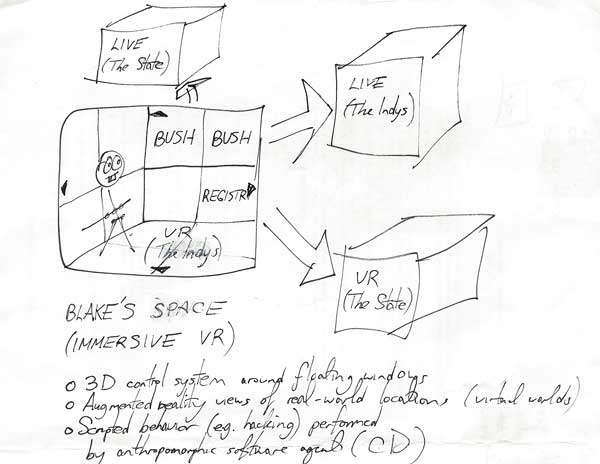
The story is set in the ´┐Żnear future´┐Ż after the point where there has been a fundamental step in the evolution of the man-machine interface. A non-invasive technology called The RIG can be used to plug into the mental processes of any willing user and use this data to render an ´┐Żaugmented reality´┐Ż point of view (POV). This POV can be of a wholly virtual world (e.g. the State Registry) or a view of the real world (e.g. the bush) as recorded by surveillance hardware. Surveillance is all-pervasive. Smart networks monitor the world.
In the story, the RIG is as common as the Eye-Toy is in 2004, a paradigm seeping into mainstream awareness as early-adopters use and abuse it.
The characters in the story do not distinguish between real-world footage (surveillance cameras), virtual world visualisation (photo-realistic data rendering) and recorded brain activity (character POVs). The key suspension of belief has to be that technology has advanced to the point that context is the only way to determine what is real. Any data source can be made to look the same. Hence the term the State uses to collectively refer to all its recorded data ´┐Ż ´┐Żvirtual memory´┐Ż.
Sanctuary makes little reference to how the virtual worlds operate. The focus is on watching Blake rather than understand what she´┐Żs doing. The notion that everything has been recorded by the system is only revealed in the credits, a pay-off and incentive to re-run and play.
The degree to which the RIG can be used depends primarily on what OPS (Operator Privileges) are available. For example, the State´┐Żs surveillance system within the sanctuary is only supposed to be available to privileged State personnel. Blake´┐Żs power is that she can steal OPS.
TIME
The film leads the audience through the story in ´┐Żreal-time´┐Ż, witnessing how Blake becomes Blade as events actually unfold.
The film´┐Żs payoff is that anything is record-able. All the events witnessed have been captured within the State´┐Żs ´┐Żvirtual memory´┐Ż, setting up the premise for the wider story universe explored in ten weeks in the head bin.
"Anything is record-able" is a fundamental rule of this world. Any POV shown in the film, in the context of the narrative, can be replayed by accessing a system with the right level of OPS. It is no coincidence that the whole film functions as a loop.
Blade´┐Żs origin story is preserved for subsequent review by characters themselves as well as the audience. The film functions as a time-capsule and seeds the idea that there are other characters sifting through ´┐Żvirtual memory´┐Ż along with the audience.
GUI
Big Brother meets Little Brother

The story-telling involves the use of three visually distinct GUIs. The use of these GUIs is a device for depicting visually, to the film audience, what kind of OPS are available. Each GUI places restrictions on what can or can´┐Żt be done by the user.
- The State interface ´┐Ż run by the Department of the Environment and Network Resources, the standard government interface across all public and secret government services. Think futuristic 3D, corporate styling.
- The Activists' interface ´┐Ż run by eco-activists who monitor the State. Think minimalist 2D, purely functional (e.g. old school Linux) styling.
- The ´┐ŻCustomised Dude´┐Ż interface ´┐Ż run by Blake, a personal interface to virtual worlds, hacked from illegal software swiped from her father´┐Żs home office. Think crude but highly flexible stick figure plastered onto top of (or embedded within) other systems.
The challenge will be to cleanly depict each of these GUIs in the narrative whilst creating opportunities for the audience to mimic Blake´┐Żs GUI-hopping behaviour in the real-time environment on DVD. The rhythm game (Groover) is all about letting the audience play wth CD and thus experience what is like to interact with the story through Blake's personal interface.
The virtual worlds of the story can appear identical to the real world (e.g. the bush). The audience is alerted to a virtual POV through CG elements that come and go either as match-moved 3D elements or as 2D overlays. The distinction between REAL-WORLD and VIRTUAL WORLD in the script can be made primarily through glitches in the virtual worlds.
JILL THE ART STUDENT
Jill wants to embrace the future, be hip and up to date in everything and has an innate (albeit NAIVE) love for animation. She remembers seeing 'Horses for Courses' somewhere?!? and became rather interested in the idea of making her BIG BREAK through remixing films quite recently.
YUKO THE WIZ KID
Yuko doesn't speak very good English but has been desperately lurking around all the new and burgeoning Social Networks like 'Mixi' and 'Multiply' in the hopes of hooking up with like-minded individuals to help with his current digital film project. When he read about 'remixable films' on Tribe.net he decided this might be another interesting 'angle' to consider.
MAY THE NEW MEDIA WHORE
May is into absolutely E-V-E-R-Y-T-H-I-N-G to do with New Media and its many infinite implications. She's doing her doctorate on 'Interactive Media for the Home' and wishes to interview Michela on her current project. She's a good person to know for 'spreading the word' because, like any good journalist, she's determined to be in on the FRONT DOOR of these developments.
ALEX THE CULTURE VULTURE
Alex is a graphic designer, writer, musician and film-maker who loves to be 'in the know' of any NEW develoment in any area and any part of the globe. Admittedly he doesn't know his Java script from his Java Tea, but he regularly attends film festivals, computer shows and art gallery openings on the off-chance he might catch a WHIFF of something exciting and radically new.
BILLY THE KID
Billy is in his early teens and doesn't quite know what he's going to do with his life. All he knows is that he loves Manga and all forms of Computer Animation, and that when he recently saw 'Animatrix' he became totally obsessed with the idea that a film could have multiple-themes and narratives which could be handled by a number of different film-makers in a variety of different styles. He doesn't know about MOD Films yet but when he eventually discovers the site, it might just become a 'turning point' for him.
MAX THE FILM BUFF
Max is the ultimate film aficionado and critic, and although something of a PURIST, is extremely keen to keep up to date with any new developments in film technology, partly in the hopes of being able to discover some new cutting-edge film maker who will be the NEXT BIG THING he writes about for one of the many publications he freelances for. Max is a really good person to know because Max knows EVERYBODY!!
PAM THE LEGAL EAGLE
Pamela is a Copyright Lawyer for a major European film distributor. Her interest in MOD Films is purely ACADEMIC, having more to do with keeping abreast of film rights and the general handlings (and mishandlings) of film content through the various trafficking of content and images brought about by the 'sharing' thereof. etc. etc. etc.
LANCE THE LURKER
Lance is a lazy bastard, otherwise he would have got something going a long long time ago. Instead he chooses to surf the net as a spectator, tuning into peoples' forums, checking out their blogs and occasionally stealing an idea as well as an image or two. He came across MOD Films a few months back and makes repeated visits to the site, claiming (mainly to himself) that one day, he too will put his 'creative' skills to some use in this area. Yeah.. dream on Lance!!
Emma is a VJ
Emma is a VJ who wants to legally re-mix high quality material. She hears about modfilms.net from VJ Central and subscribes to modfilms.net in order to download some new material for her sets.
MACK THE HACKER
Mack's been hacking into computers since he learned how to say "Help me Obi-Wan you're my only hope!" He vehemently RESISTS any idea of making remixable film software available through open source because it might take the lime-light away from the pirates and hackers who he fancifully believes are the only true HEROES in the information technology game. This however doesn't mean that he hasn't already hacked himself a copy of this software or that he won't continue to keep an inquistive eye on MOD Films.
DAVO THE GAMER
Davo is a video game developer, designer and user who spends most of his online time conducting forums, discussions and reviewing new PC and Mac games as well as console games by leading retailers like Sony and Nintendo. Basically.. what Davo doesn't know about video games, simply isn't worth knowing. He would love to use the application software licensed by MOD films on some of his own games.
Partner benefits
How can a re-mixable film benefit partners?
- flexible media shapes
- project archival
- global indexing
- commercial packaging
- free R&D
- fun e-learning
CD as interface - xeyes
The old UNIX app, XEyes, is the original hook for CD to form part of the user interface.
Flash implementation:
http://www.figleaf.com/development/flash5/eyes.swf
Little Brother - smart sensor network
Scientific American has thoughtfully run a story on the technology that underpins how the eco-activists and the State could keep tabs on one another in the real world using Tiny OS, RFID and other things.
http://www.sciam.com/article.cfm?articleID=00031F95-6274-10A9-A19983414B7F0000
Stereo Photogrammetry
Nick Doff from Artemis Digital has supplied a video showing their new live action/mocap service in action. They've already offered to do up to 2mins of mocap on CD for free so maybe deal possibilities.
Download video (MPEG1)
August 09, 2004
Battlestar Galactica
Dale Herigstad of Schematic gave me a sneak preview last night of the look and design background to the XBox2 prototype he is building for the XBox2 edition of the Battlestar Galactica TV series. Smooth segues from TV to shoot 'em up to network promo to EPG (electronic programme guide). The defacto standard 3D interface seems to come from him (e.g. TimeWarner interactive TV trials in Orlando, Minority Report, X Files, XBox 2....)
"reality space" aesthetic. CGI warfare scenes feel like hometown aerial shows shot by handheld camera, with abrupt zooms, unexpected pans and streaming contrails.
http://www.wired.com/news/games/0,2101,61436,00.html
